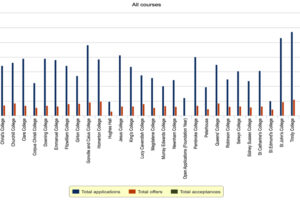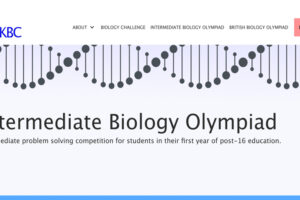
Tips on writing Oxford and Cambridge application essays!
Summer is halfway over, and application season is about to begin. Many students are diligently preparing their personal statements (PSs).
Starting this year, the 26th fall application process will move away from the traditional “essay” format and revamp the application to three precisely structured questions.
After the revision, when writing the new PS, we should focus on two questions:
1.What is the difference between the new and old formats?
2.What are these three questions, and how can we answer them effectively?
Based on these two questions, we will provide guidance on writing the new 26th fall application:
01 What are the characteristics of the revised application?
1.Different universities in the UK have different application requirements. Applying to multiple schools often makes it difficult to coordinate the content of your application. Therefore, UCAS has standardized the standards, allowing students to focus on three core questions.
2.UCAS’s change to structured questions and limited length provide students with a clear writing direction. This also allows universities to more directly identify the questions they are interested in, allowing for a more refined format.
Although the format has changed, the content remains largely the same as the old application, focusing on the three key questions.
02 What are these three questions?

First question: Why did you choose this program and why do you want to study it in college?
The official website provides some examples of how this program has played a role in your life; where does your understanding and interest in this program come from? What knowledge or specific sub-fields have you learned?
This requires applicants to clearly express their academic interests, passions, and motivations. Don’t just say “I like it” or “I’m good at it”; demonstrate your academic exploration through specific experiences.
Second question: How have your learning experiences, academic abilities, and skills to date prepared you for success in your major at university?
The core of this second question is to systematically present your academic competence.
For example, you can include information about competitions, awards, research experience, standardized test scores, summer programs you’ve attended, and any other areas of background development you’ve taken.
But simply writing about it isn’t enough; you need to highlight how these experiences have helped you pursue your academic exploration and develop your adaptability to university studies.
Third question: What additional preparation have you done to better prepare for your university application? Why will these experiences be beneficial to your application?
You can include your extracurricular activities, internships, volunteer experiences, online courses, self-study projects, and so on.
The key is to connect these academic activities to the discipline you’re applying for, specifically, how they honed your professional skills, teamwork writing, and problem-solving abilities.
03 What Not to Include?

·Write your essay objectively.
Your essay should be objective and not overly subjective.
For example, boasting about being a genius in a particular area is completely unconvincing.
You need to demonstrate your passion for academics through objective achievements or research, logically building your personal profile.
Even for teacher recommendations, avoid directly stating the student’s strengths. Instead, provide reasoned support for the student.
·Don’t Include Information You Don’t Know
You shouldn’t overstate your content, especially if you’re not fully understanding it. If you’re asked about it during an interview by a professor and can’t answer, it can be very embarrassing.
·Never plagiarize or over-borrow.
UK essays are checked for plagiarism, so your essay must be original.
Also, avoid using AI to write your essay. Current technology can detect AI-generated writing.

·The essay quality doesn’t match your actual level.
In one case, a student’s essay was so well-written, demonstrating a high level of English proficiency, that the university gave him a conditional offer with an IELTS writing score of 8.5. However, he ultimately failed the con, demonstrating that his essay was not up to par with his actual level.
For universities, essays don’t require exceptional writing skills; a touch of rawness and authenticity, more in line with the level of a middle school student, is better.
·Don’t include information already in your application materials.
There’s no need to add information in your essay that the university already knows, such as your university, the subject you applied for, your A-Level results, etc.
This information has already been included when you submitted your application to UCAS, so there’s no need to waste characters.
·You don’t need to include anything you’ve already mentioned in a letter of recommendation in your essay.
The essay and the letter of recommendation should complement each other, rather than writing two identical pieces. Submitting a letter of recommendation would be pointless.
·Never show your completed essay to anyone else.
Keep your essay confidential. A student once wrote an exceptionally well-written essay and showed it to someone else. The other person, impressed by the content, used it for their own use, forcing the student to frantically revise it.
British essays are checked for plagiarism. If someone else uses your clever ideas, you can’t use them again. Therefore, never show your essay to anyone else.
04 Details of Essay Writing
What qualities make a good essay?
·First, your essay’s wording must be appropriate.
This is different from IELTS writing. You don’t need to use fancy vocabulary and sentence structures. It’s best to use simple words and sentences to clearly and logically express your ideas.
This approach not only reflects the academic qualities universities seek in applicants, but also meets the implicit requirement of “sincerity” in British universities’ essays.
·Secondly, maintain a consistent overall writing style.
It’s recommended to use vocabulary that reflects your true level throughout your essay. For example, write your essay in the style you choose.
Explaining complex experiences clearly and down-to-earth is much more effective than forcing long, complex English sentences. Remember, admissions officers are looking for a genuine and vivid version of you, not a walking Oxford Dictionary.
·Third, pay attention to proper punctuation.
When answering your essay, be sure to use written language; avoid overly colloquial language or using handwritten text.
Finally, pay close attention to proper punctuation. Chinese punctuation differs from British punctuation, requiring meticulous attention to detail.
05 How to Accumulate Essay Materials
If you’re short on essay materials, you can also watch some hardcore science videos online.
These videos explain principles from a rigorous perspective. They can serve as examples of our passion for a subject and our deep understanding of it. They can also help you quickly accumulate material.
06How to establish a framework for your essay?
Before beginning to write your essay, you should brainstorm, outlining all your strengths and then considering what to include and what to leave out.
The initial content can be written entirely in Chinese, which we are proficient in. Don’t worry about length, spelling, or even grammar. The most important thing is to first write the core content and then develop a framework.
Then, we gradually add the necessary content to this framework, just like adding flesh to a skeleton. We then adjust the logical order and priority of the “flesh” and refine the presentation of specific examples. Finally, we adjust for cultural adaptability and refine the word count until every single letter is immovable.
I hope that the above explanation will help you understand how to write your essay, how to answer the three core questions, and the final presentation.
In general, application essays require careful preparation and polish, aiming to showcase your strengths and potential while avoiding overstatement or misleading content.
Through careful planning and organization, we can better showcase our strengths and characteristics, thereby increasing our chances of application success.



